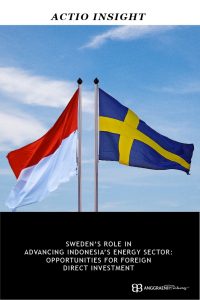SWEDEN’S ROLE IN ADVANCING INDONESIA’S ENERGY SECTOR: OPPORTUNITIES FOR FOREIGN DIRECT INVESTMENT
By Setyawati Fitrianggraeni, Tanya Widjaja Kusumah[1]
Keywords : “Energy Sector in Indonesia”, “Sweden-Indonesia Bilateral Relations”, “Renewable Energy Development”, “Small Modular Nuclear Reactors”, “Energy Efficiency Initiatives”, “Smart Grid Technologies”, “Foreign Direct Investment in Indonesia”
Despite geographical and demographic differences, Indonesia and Sweden have share many similarities and can build closer bilateral relations in the future, such as in the fields of energy and transportation. Trade and investment relations between Indonesia and Sweden continue to grow in 2023. According to the Indonesian Central Bureau of Statistics (“Badan Pusat Statistik” or BPS) the value of bilateral trade grew 9% to USD 874 million from USD 800 million in 2021. In addition, the investment value from Sweden to Indonesia in 2022 had increased to USD 59.3 million with a total of 125 projects.[1]
For potential investment in the energy sector, Indonesia has encouraged Sweden to collaborate in efforts to reduce emissions using renewable energy, such as through green hydrogen and green ammonia development projects. Sweden’s vast expertise i[2]n developing small modular nuclear reactors (SMR’s), which is regarded as a clean energy sources can produce large amounts of electricity.[3] in February 2021, a Swedish company signed an agreement between a small modular reactor (SMR) developer and the Royal Institute of Technology (KTH). The Project involved constructing a demonstration SMR at the Oskarshamn site by 2030. The LeadCold SEALER SMR is designed to generate 3-10 MWe over a 10-30 year period without the need to refuel. Indonesia is keen to develop similar SMRs and Indonesia has signed partnerships with other countries including the USA and Denmark. .
Sweden’s knowledge and experiences in SMR development can contribute to Indonesia’s efforts to diversify its energy mix and reduce carbon emissions. Sweden can already boast that Swedish companies have a solid track record in this field. In fact it is a Swedish company who was the first in Scandinavia to develop SMR projects in March 2022.[4]
Indonesia is one of the world’s fastest growing economies. Between 2015–2030, the country’s energy needs are forecasted to increase by 75 percent and electricity needs are forecasted to triple. At the same time, according to the Paris Agreement, the Indonesian Government is aiming at achieving 23 percent renewable energy in 2025 and having lowered carbon dioxide emissions by 29 percent by 2030. There were several potential investments in the energy sector that Sweden can support for Indonesia in this regard:
- Renewable Energy Development: Sweden has extensive experience in renewable energy, particularly in wind power and bioenergy. Sweden can share its knowledge and expertise in these areas to support Indonesia’s renewable energy development, including project planning, technology selection, and grid integration.
- Energy Efficiency: Sweden is known for its successful energy efficiency programs and initiatives. Sweden can provide guidance and technical assistance to help Indonesia improve energy efficiency in industries, buildings, and transportation sectors. This support can include energy audits, energy management systems, and capacity building programs.
- Smart Grids and Grid Integration: Sweden has advanced smart grid technologies and expertise in grid integration of renewable energy sources. Collaboration with Swedish companies and institutions can help Indonesia modernize its grid infrastructure, optimize energy distribution, and enhance grid stability as it integrates more renewable energy into its power system.
- Electrification of Remote Areas: Indonesia has many remote areas that lack access to electricity. Sweden can support Indonesia in extending electricity access to these regions through innovative solutions like off-grid and mini-grid systems. This can involve providing technical assistance, project development support, and knowledge exchange on renewable energy-based electrification models.
- Energy Storage Solutions: Sweden has made significant progress in energy storage technologies, including battery storage and thermal storage. Collaboration in energy storage solutions can help Indonesia address the intermittency of renewable energy sources, enhance grid stability, and improve energy reliability.
The Indonesian government supports foreign direct investment in line with the National Long Term Development Plan 2005-2025, which envisions that Indonesia increase investment in infrastructure, human capital, and science and technology, as well as improve exports and develop competitive advantages of Indonesia.[5] Indonesia provides convenience for foreign investors including digitalized licenses through Indonesia National Single Window, Indonesia’s Positive Investment List which allows foreign investment in over 200 business sectors, including transportation, energy, and telecommunications. There are also fiscal and non-fiscal incentives available for priority sectors, including tax holidays.
Foreign direct investment in Indonesia can take many forms including operational cooperation, profit sharing, subcontracting, outsourcing, or distribution. Indonesia already has a legal and financial environment that Swedish investors are comfortable and are familiar with. The Indonesian energy sector may be a profitable and sustainable investment for Swedish companies.
DISCLAIMER
Neither party may assume that he or she should act or cease to act or choose to act on a particular matter based on this information without seeking advice from professionals in the field of law in accordance with certain facts and circumstances it faces.
For further information, please contact:
P: 6221. 7278 7678, 72795001
H: +62 811 8800 427
S F Anggraeni
Managing Partner
Tanya Widjaja Kusumah
Managing Associate
Practice Group Legal Compliance and Governance
[i] Setyawati Fitrianggraeni serves as the Managing Partner at Anggraeni and Partners in Indonesia. She is also an Assistant Professor at the Faculty of Law, University of Indonesia, and a Ph.D. candidate at the World Maritime University in Malmo, Sweden. Tanya Widjaja Kusumah a Managing Associate in the Legal Compliance and Governance Practice Group at Anggraeni and Partners. The writers wish to express their gratitude to Dr. Hary Elias for his valuable feedback on the article
Reference
[1] https://kemlu.go.id/portal/en/read/4419/berita/trade-and-investment-between-indonesia-and-sweden-increased-in-2022-amidst-global-economic-uncertainty
[2] https://world-nuclear.org/information-library/country-profiles/countries-o-s/sweden.aspx
[3] https://ekon.go.id/publikasi/detail/4972/indonesias-presidency-in-asean-and-swedens-presidency-in-the-european-union-2023-together-building-and-promoting-sustainable-economic-growth-in-both-regions
[4] https://www.grs.de/en/nuclear-energy-sweden-15022023
[5] Business Climate Survey for Swedish Companies in Indonesia 2021

